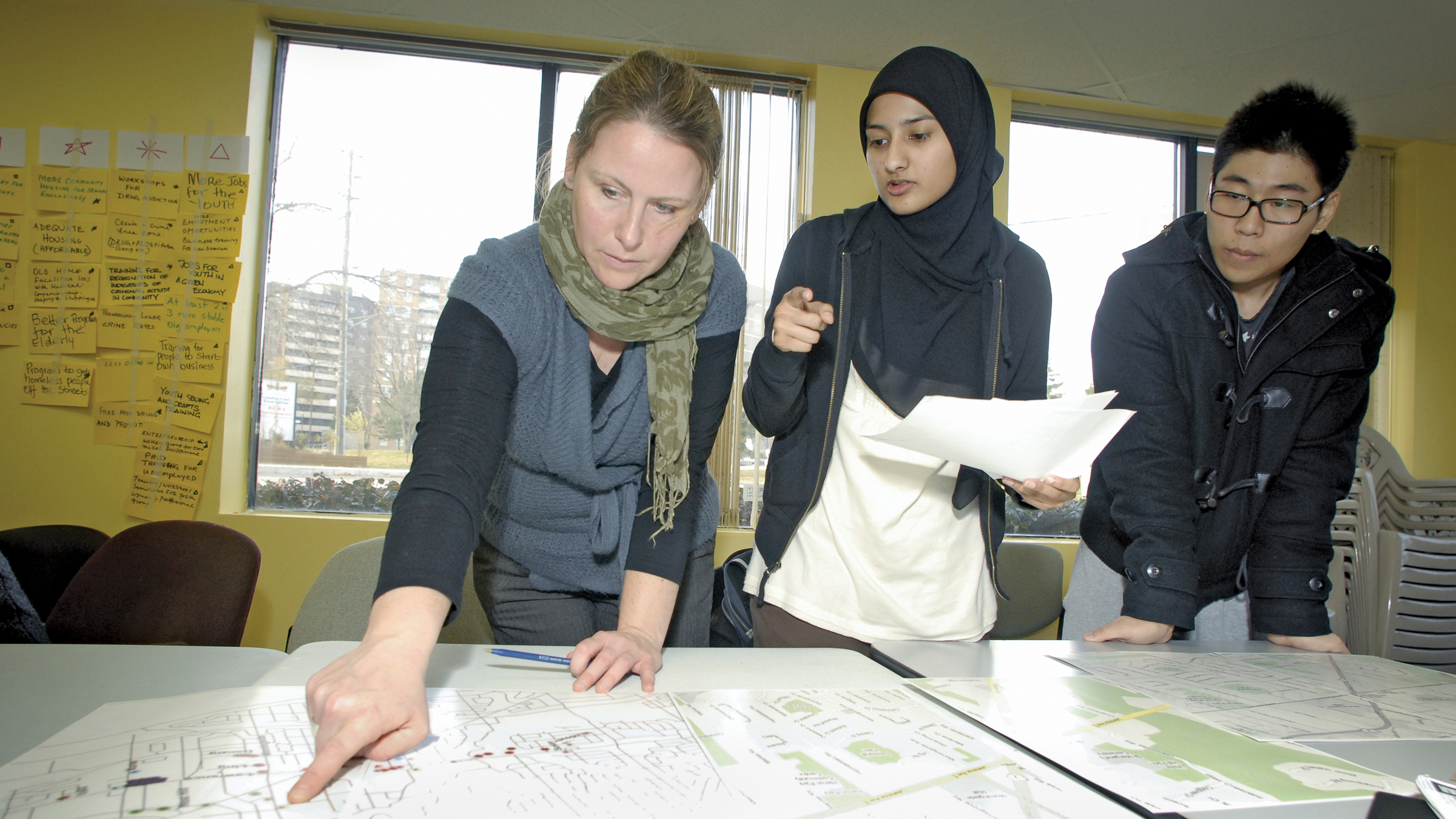Profile:
Learning in Community Service, CITC02
Learning in Community Service, CITC02 is a third-year community service learning undergraduate course in the City Studies program, Department of Human Geography, at the University of Toronto Scarborough. The course is taught at the East Scarborough Storefront, a community hub that is located in the Kingston-Galloway/Orton Park (KGO) neighbourhood in eastern Scarborough. Residents in the neighbourhood face challenges related to poverty, insufficient community and transit infrastructure, and higher than average unemployment levels. KGO is also a thriving and diverse neighbourhood with vital social service and community-based programs for residents. The course is formed by the creation and maintenance of meaningful and sustainable associations with placement organizations/community partners. Since 2009, students have been placed with 21 different organizations and programs working in or with the KGO neighbourhood. The thematic focus of the course is community-based development and planning with a service learning placement component for students of four hours per week over an eight-week period, reflective assignments and an end-of-term ‘mini-conference’ that brings students and community partners together.

Program Details
Instructor / Program Coordinator(s):
Susannah Bunce, Associate Professor, Department of Human Geography, University of Toronto Scarborough
Profile(s):
External Partners Faculty & Staff Students
Division:
University of Toronto Scarborough
Benefits to Students:
Students work closely with their service learning placement hosts on projects that are determined by their placement organization. Students have engaged in policy research, created social service inventories and databases, worked alongside front-line social service staff with local youth and in children’s arts, sports, and homework programs, and in neighbourhood food banks and the community garden and kitchen, among other contexts. Students learn about community-based development and planning through first-hand, practical experiences and then relate these experiences to course ideas and concepts that we discuss in class. Students learn about the vital work that social service agencies and community organizations do but also about the multiple challenges that agencies and organizations currently face in relation to funding cutbacks, staffing shortages, and increased requests for services and programs. Students form close associations with their placement organizations and often bring their own skills, diverse backgrounds and language skills to their placement contexts.
Benefits to External Partners and the Community:
The course could not be sustained without the support, care, and thoughtfulness of community partners in hosting student placements. Community partners benefit from having students bring their diverse skills and knowledge to bear on particular projects. The energy and dedication of students to their service learning tasks is often noted by community partners, with students suggesting new tasks and being open to working on multiple projects. I am mindful that students are not replacements for paid staff and that they, instead, augment the key work of social service agencies and community organizations in order to provide immediate assistance and relief.
Benefits to the University:
Community-engaged learning has been a cornerstone of the City Studies program over the past ten years and the course has attracted students from outside the department and Scarborough campus. The course has helped to innovate new and diverse ways of teaching and learning in the City Studies program and the Department of Human Geography by providing students with experiences beyond the more traditional lecture or seminar-based class. The community-engaged learning approach appeals to students who have different learning styles, who like to apply theory to practice, and who are searching for some ideas about post-graduation career paths. It is also the first service learning course at the University of Toronto Scarborough to be taught off-campus, in a community-based environment.
Information for Interested Students:
Visit the University of Toronto Scarborough’s Department of Human Geography’s City Studies page focused on Community Development to find additional information about this course, including eligibility requirements and when this course will be offered.
Advice for Faculty and Staff Interested in Creating a Similar Experiential Learning Opportunity:
Community partner needs must come first when developing a community-engaged learning course. Instructors must work closely with community partners to identify the needs and gaps that students could address. This entails a lot of groundwork in building and maintaining meaningful relationships. It is important to ensure that the time of community partners is being conserved and that expectations are defined in an equitable and reciprocal way in advance of the course.
Students may not have worked in a community-based setting or workplace so it is important to familiarize students with these experiences before their placements starts. This can be done through anti-oppression and diversity workshops offered by the university, in-class discussions about some of the issues and experiences that students may encounter, as well as discussing student expectations in advance of their community work.
I recommend learning about different pedagogies of community service learning and community-engaged learning. This is where the Centre for Community Partnerships can provide excellent assistance. It’s also important to be self-reflexive and flexible when instructing community-engaged learning courses and to embrace the times when your teaching ideas and schedule may not go as planned. In sum, community-engaged learning is an enjoyable, different, and meaningful teaching practice where instructors frequently learn alongside and from students and community partners.
Professor Susannah Bunce and students from CITC02 (Photo by Ken Jones, UTSC)
Details
Partnership Based
Curricular
Unpaid
